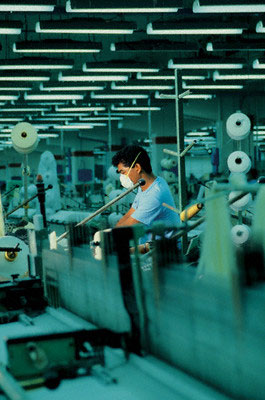Reuters
Jun 11, 2009
Upgrade for China export hub comes at wrong time
Reuters
Jun 11, 2009
By James Pomfret
SHENZHEN, China (Reuters) - Just as China's "world factory" of the Pearl River Delta sees its first signs the worst of the global crisis is over, it faces a fresh threat from a drive to upgrade its rusting, low-end industrial zones.
 |
Critics say the push will cause a fresh wave of factory closures and add to the rising loss of jobs, doing further harm to a region that produces a third of China's exports and generates a tenth of economic activity.
The incentive for change is clear. After 30 years of rapid industrialisation, officials say the Pearl River Delta's (PRD) overwhelmingly low-cost, low-margin export-focussed manufacturing assembly model is increasingly unsustainable.
The region in Guangdong province north of Hong Kong has also been overtaken by the Yangtze River Delta -- a much larger region near Shanghai in eastern China that has had more success at attracting high-tech industry investment.
China's exports are still falling rapidly from year-earlier levels but data on Thursday 11 June showed they rose a modest 0.2 percent from April, adding to other evidence that the economy may be on the path towards recovery.
But some are questioning the timing of the push for more advanced industry in the PRD, which has seen a collapse in orders from major buyers in the United States and Europe wipe out 20-40 percent of its business.
Thousands of factories in the sprawling industrial area known as the workshop of the world have closed and the government has estimated more than 23 million rural migrant workers have lost their jobs nationwide, with the PRD particularly hard hit.
"The world is in chaos, yet the Guangdong government has prematurely launched a campaign of upgrading the industrial structure," said Dong Tao, a China economist for Credit Suisse.
"That strategy has some flaws and the timing couldn't be worse," Tao added.
"EMPTY THE CAGE"
Guangdong's reformist Communist Party leader Wang Yang is pushing for a shake-out of "backward productive forces." Even as the slump worsened last year, he called for the chance to "to empty the cage for new birds."
"In the Pearl River Delta there is only so much land. The cage is only this big, and yet to attract advanced industries there is no land left," Wang Yiyang, the deputy director of the Guangdong Development Research Centre.
"What can you do? So you need to phase out the old labour-intensive industries to create more space," Wang, who advises on the PRD's development strategy, told Reuters.
The strategy to phase out old factories remains more a guideline than mandatory policy right now, but it is backed by Beijing, whose top economic planning agency published a "2020" reform and development blueprint to transform the PRD into an advanced manufacturing and services hub.
"The overall industrial level is low ... the innovative capability is insufficient, and the overall competitiveness is not strong," the report said.
To be sure, some industrialists are trying to claw up the value-chain, seeing little future in low-margin production that has been hard hit by rising costs.
"We need to put investment into new technology products ... and that's the way to bring the industry to a higher-value added category," said Ng Chi-ho, whose Hong Kong-listed Suga International (0912.HK) creates niche innovative electronics products for major brands in three Delta factories.
"It's not just about upgrading the manufacturing technology, we also have to upgrade the product development capability for higher margins. I find that to be very important," he added.
FIND NEW BIRDS
Attracting fresh FDI will be key to reviving the region after the downturn. But low-margin sectors like garments, toys and shoes could face resistance to their investment plans from local officials intent on attracting higher-margin firms.
"In the long run if you can get the young wood that's a good thing," said Tao, who predicts as much as one third of Guangdong's export manufacturers could close down by 2010.
"If you cannot get the young wood, then that space will be empty. In the current economy, that will be translated into unemployment, decline in service volumes and it will have implications for the property market and wage rates."
Others say push has tarnished the PRD's free market image and may be a political gambit by Wang Yang to rein in officials like Shenzhen's mayor who was fired after a corruption probe.
"It's having a negative impact ... like adding frost on top of the snow," said Zhu Jianguo, a political analyst in Shenzhen.
While Guangdong pioneered China's economic transformation, the Yangtze River Delta has pulled well ahead of Guangdong.
It now accounts for slightly more than a third of China's exports and nearly 20 percent of the country's economic activity.
A mix of better co-ordinated and proactive policies have proven far more successful than the PRD in luring top FDI dollars and fostering high-tech industries, including a cluster of leading global contract laptop computer makers such as Taiwan's Quanta (2382.TW), as well as Compal (2324.TW) and Wistron (3231.TW).
"Many Taiwan enterprises left the Pearl River Delta mainly because when they wanted to upgrade, they got insufficient policy support from the local governments when compared with the Yangtze River Delta," said Chun Yang, an assistant professor at the Chinese University of Hong Kong who researches PRD development.
"For developing IT industries, the local governments really need to support the global production networks."
While Guangdong officials say the plan is market driven and non-targeted -- smaller factories are braced for change.
"Traditional industries must have the space to survive. If they all upgrade or change to computers or high-tech businesses, who will make the clothes, consumer products and sports shoes?," said Danny Lau, the head of Hong Kong's Small and Medium Enterprises Association. "Transformation must be gradual."
(Editing by Neil Fullick)
© Thomson Reuters 2024 All rights reserved.
























